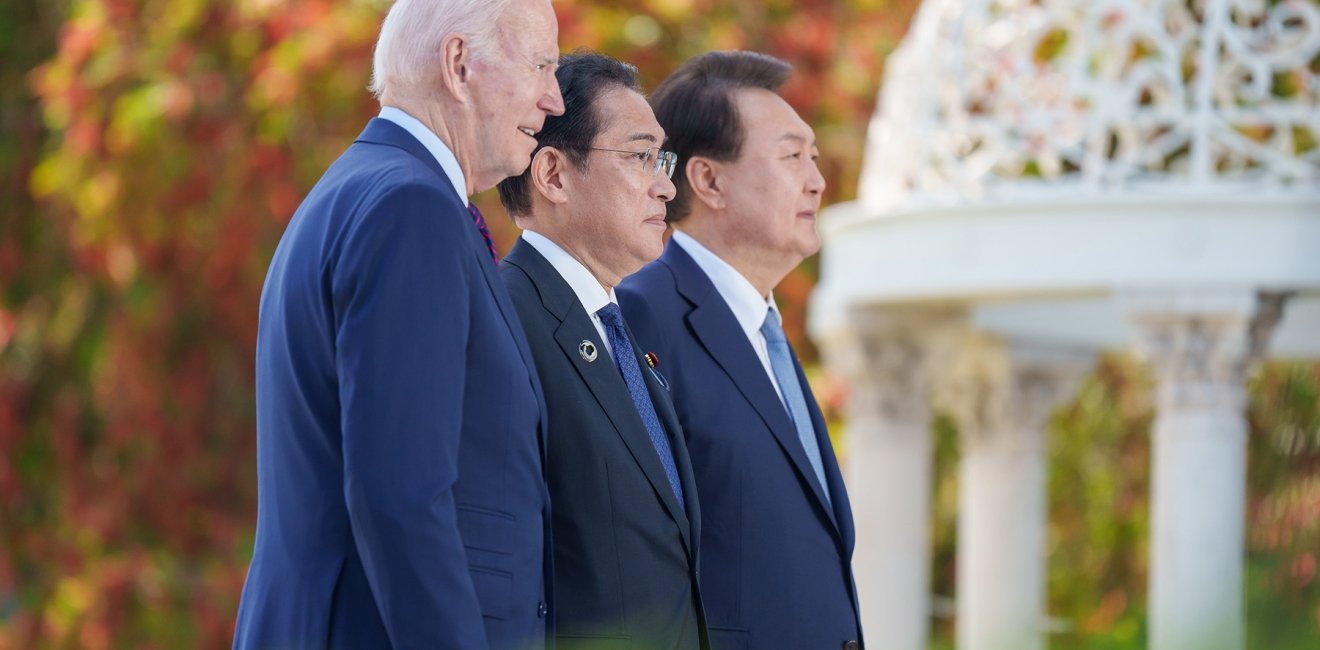
A blog of the Indo-Pacific Program
When the leaders of the United States, Japan, and South Korea gather at Camp David on August 18, they will already have met their primary objective, namely to engage in a constructive trilateral dialogue. The fact that this will be the first time the three heads of state will gather specifically for a trilateral meeting, rather than on the sidelines of an international conference, is the most significant development yet in the thawing of relations between Tokyo and Seoul. It will also test the role of the United States as a bridge-builder that leads to improved relations that endure.
The road to Camp David has hardly been an easy one, as relations between Japan and Korea deteriorated rapidly since 2019. A change in leadership in both countries has helped to reset ties, with South Korean President Yoon Suk Yeol’s visit to Tokyo in March, coupled with efforts to resolve the 2018 Korean court ruling to take punitive action against the use of forced Korean labor during World War II by Japanese companies, leading the way to a bilateral rapprochement. The trilateral to be held at the U.S. presidential retreat is expected to enhance relations between President Yoon and Japanese Prime Minister Fumio Kishida still further, and also allows Washington’s two principal partners in the Indo-Pacific to focus on cross-border issues including North Korea’s nuclear ambitions, the threat posed by China, and regional security more broadly.
Looking ahead, the success of the trilateral summit will ultimately lie in the durability of the partnership between two of the most powerful democracies in Asia. While both Washington and Tokyo have publicly welcomed the overtures initiated by President Yoon, the Korean leader continues to face considerable political opposition to his vision to strengthen ties with Japan. In addition to continued tensions over the politicization of historical memory, Japan’s plans to release treated water from the Fukushima nuclear power station have become a new source of friction between the two sides, even as the IAEA and the international scientific community more broadly have reassured the public that the release of the water will have a negligible impact on people and the environment. Meanwhile, sovereignty of the islets of Takeshima according to Japan, or Dokdo remains a source of political tension between the two countries.
Personalities matter in diplomacy, and a demonstrated rapport between President Yoon, Prime Minister Kishida, and President Biden is a prerequisite for the summit’s success.
For Japan, one of the biggest concerns is the staying power of any commitments made by the Yoon administration. While President Yoon’s commitment to enhance relations with Japan have been broadly appreciated by the Kishida government, there is still wariness about the tenacity of the progress made by the current Korean administration, and whether any new agreements would be supported by Yoon’s successor from 2027 onwards. As such, any lasting impact of the Camp David summit must be to ensure that commitments made between Japan and Korea will not be endangered by domestic political developments in the future.
Personalities matter in diplomacy, and a demonstrated rapport between President Yoon, Prime Minister Kishida, and President Biden is a prerequisite for the summit’s success. But the real test of the Camp David meeting will be whether the three leaders will be able to ensure that bridging divides and building relations can be institutionalized so that diplomatic relations can withstand political change.
Follow Shihoko Goto, acting director of the Asia Program, on Twitter @GotoEastAsia.
The views expressed are the author's alone, and do not represent the views of the U.S. Government or the Wilson Center. Copyright 2020, Asia Program. All rights reserved.
Author


Indo-Pacific Program
The Indo-Pacific Program promotes policy debate and intellectual discussions on US interests in the Asia-Pacific as well as political, economic, security, and social issues relating to the world’s most populous and economically dynamic region. Read more





